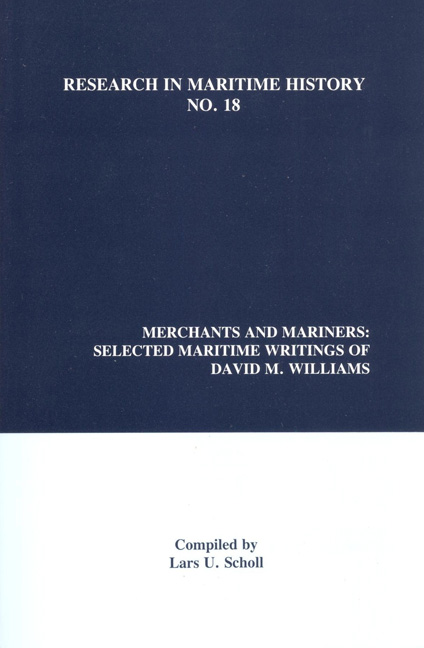Book contents
- Frontmatter
- Contents
- “Introduction”
- “David Malcolm Williams: A Tribute from an Old Friend”
- “David M. Williams and the Writing of Modern Maritime History”
- Writings
- “Abolition and the Re-Deployment of the Slave Fleet, 1807-1811”
- “Liverpool Merchants and the Cotton Trade 1820-1850”
- “The Shipping of the North Atlantic Cotton Trade in the Mid- Nineteenth Century”
- “Merchanting in the First Half of the Nineteenth Century: The Liverpool Timber Trade”
- “James Silk Buckingham: Sailor, Explorer and Maritime Reformer”
- “State Regulation of Merchant Shipping 1839-1914: The Bulk Carrying Trades”
- “Customs Evasion, Colonial Preference and the British Tariff, 1829- 1842”
- “Bulk Passenger Freight Trades, 1750-1870”
- “Henry Mayhew and the British Seaman”
- “Mid-Victorian Attitudes to Seamen and Maritime Reform: The Society for Improving the Condition of Merchant Seamen, 1867”
- '“Advance Notes' and the Recruitment of Maritime Labour in Britain in the Nineteenth Century”
- “The Quality, Skill and Supply of Maritime Labour: Causes of Concern in Britain, 1850-1914”
- “David M. Williams: A Bibliography”
'“Advance Notes' and the Recruitment of Maritime Labour in Britain in the Nineteenth Century”
from Writings
- Frontmatter
- Contents
- “Introduction”
- “David Malcolm Williams: A Tribute from an Old Friend”
- “David M. Williams and the Writing of Modern Maritime History”
- Writings
- “Abolition and the Re-Deployment of the Slave Fleet, 1807-1811”
- “Liverpool Merchants and the Cotton Trade 1820-1850”
- “The Shipping of the North Atlantic Cotton Trade in the Mid- Nineteenth Century”
- “Merchanting in the First Half of the Nineteenth Century: The Liverpool Timber Trade”
- “James Silk Buckingham: Sailor, Explorer and Maritime Reformer”
- “State Regulation of Merchant Shipping 1839-1914: The Bulk Carrying Trades”
- “Customs Evasion, Colonial Preference and the British Tariff, 1829- 1842”
- “Bulk Passenger Freight Trades, 1750-1870”
- “Henry Mayhew and the British Seaman”
- “Mid-Victorian Attitudes to Seamen and Maritime Reform: The Society for Improving the Condition of Merchant Seamen, 1867”
- '“Advance Notes' and the Recruitment of Maritime Labour in Britain in the Nineteenth Century”
- “The Quality, Skill and Supply of Maritime Labour: Causes of Concern in Britain, 1850-1914”
- “David M. Williams: A Bibliography”
Summary
That wage levels are a crucial factors in any labour market is obvious enough. What is less evident is the impact of how wages are paid. Yet the nature and supply of labour are clearly influenced by the form of payment, whether by time (hour, day, week or longer) or the piece, following the completion of agreed tasks or services in small or large units. Forms of payment depend on many elements, notably the character and context of the labour involved and the customary practice that evolved over time. In the age of sail, seafaring labour was paid in various ways, with differences arising from the specific character of the work undertaken. In whaling and some fisheries, labour was paid by the “lay,” receiving a share in the returns of a voyage; a similar form of remuneration prevailed on privateers. Payment by the piece, in this instance the voyage, was the usual practice on other fishing vessels and in short-sea trades - in the case of Britain, for instance, coastal shipping (especially the coal trade from the northeast to London) and on nearby European routes. But many seafarers in the merchant service were paid by the month at a rate (which often varied according to destination) agreed at the time of enlistment. Still, many merchant seamen, particularly those engaged for long overseas voyages, were in a sense piece workers, paid on completion based on the duration of the voyage at the agreed rate.
While the level and form of returns to labour were clearly crucial influences on the labour market, the timing of the payment was also significant. Seamen, compared with most types of labour, were exceptional in that many were paid irregularly, at the completion of voyages afer months or even years of service. But while such recompense came at the termination of employment, seamen were also often paid in advance for part of their labour. Such payments might be in cash or in the form of an “advance note.” In Scandinavia and the Baltic advances were in cash, while in France, Belgium, the Netherlands and Germany notes were more common. In Britain, advances were invariable in the form of notes.
- Type
- Chapter
- Information
- Merchants and MarinersSelected Maritime Writings Of David M. Williams, pp. 253 - 272Publisher: Liverpool University PressPrint publication year: 2000



